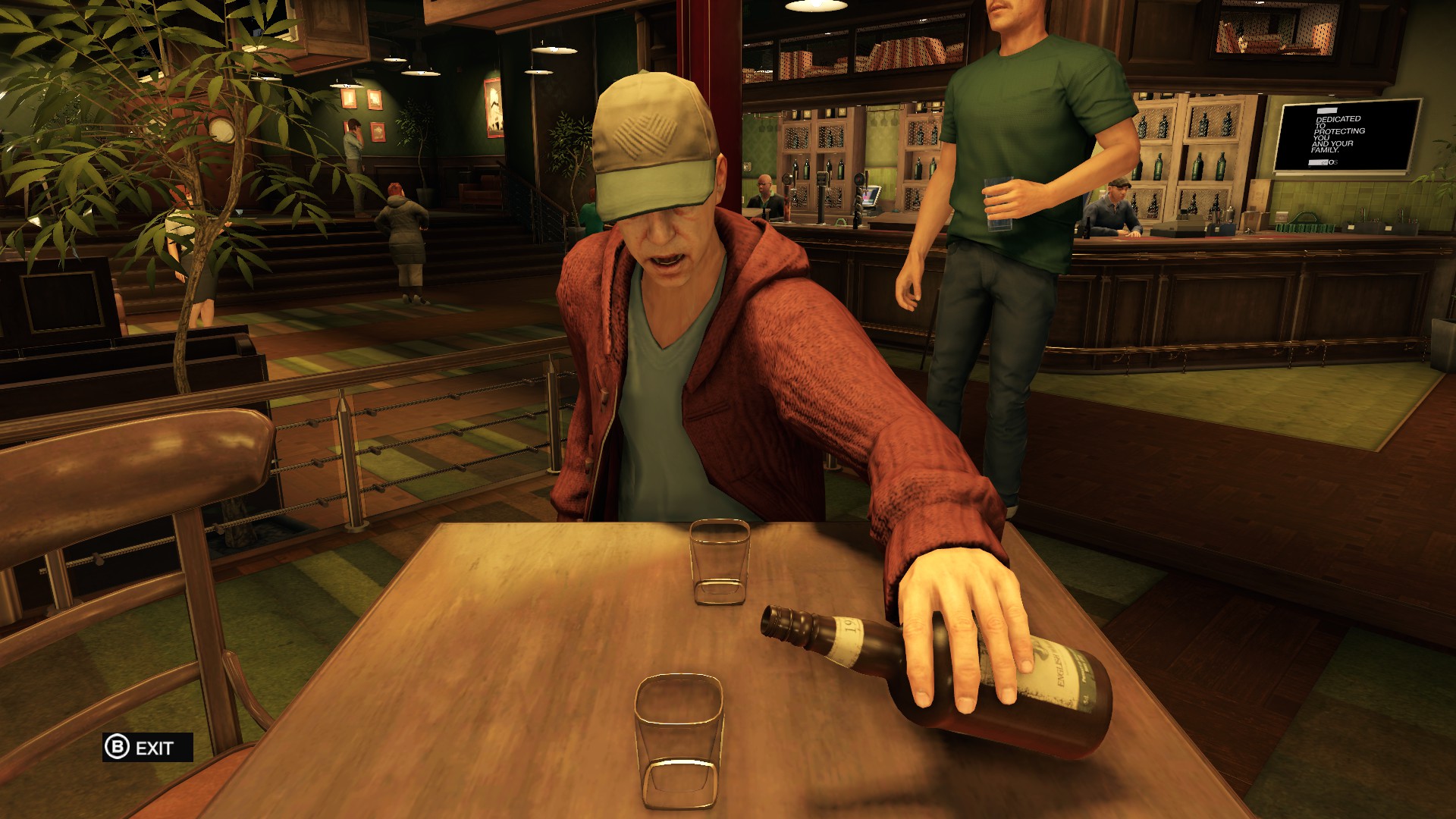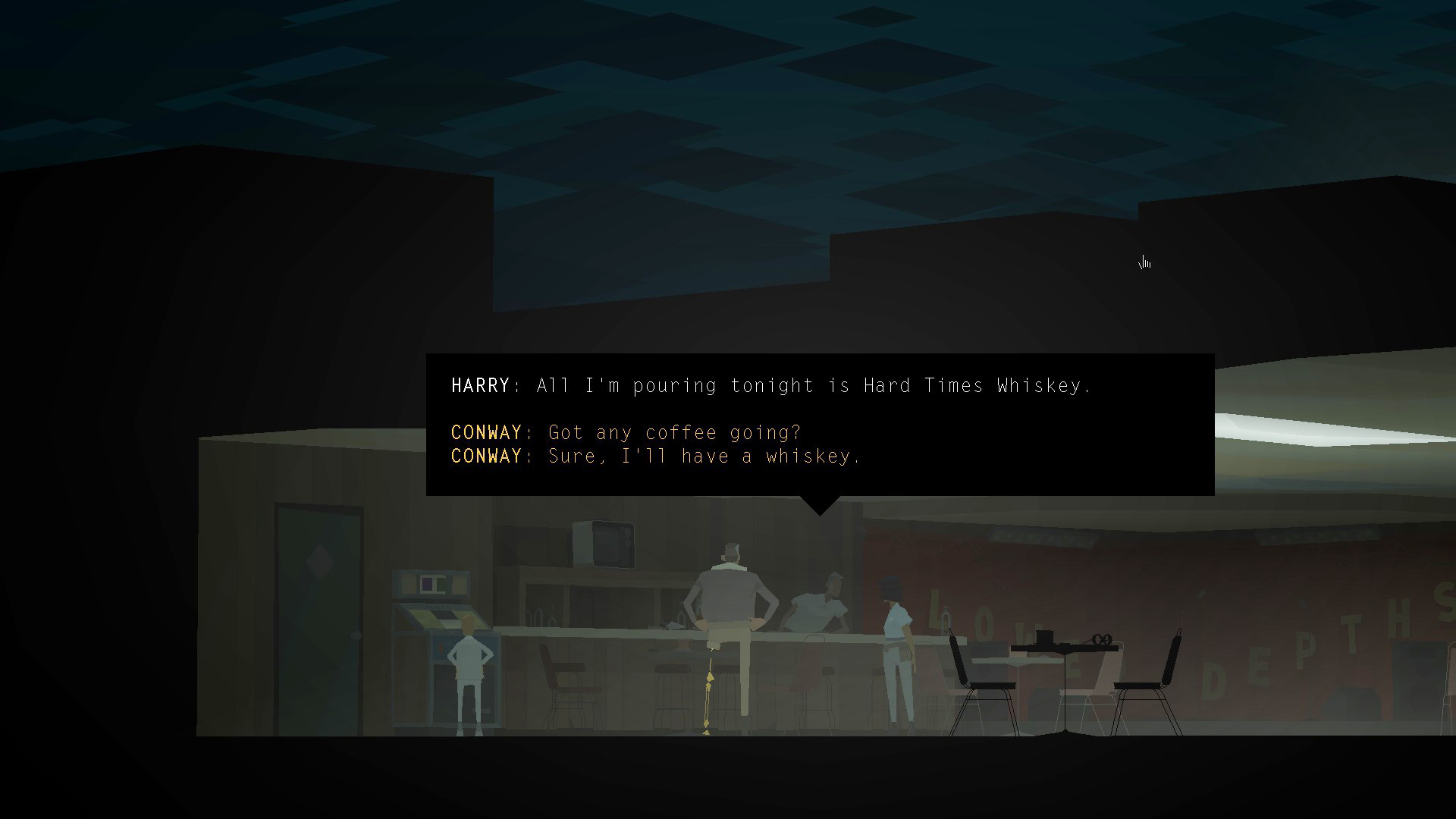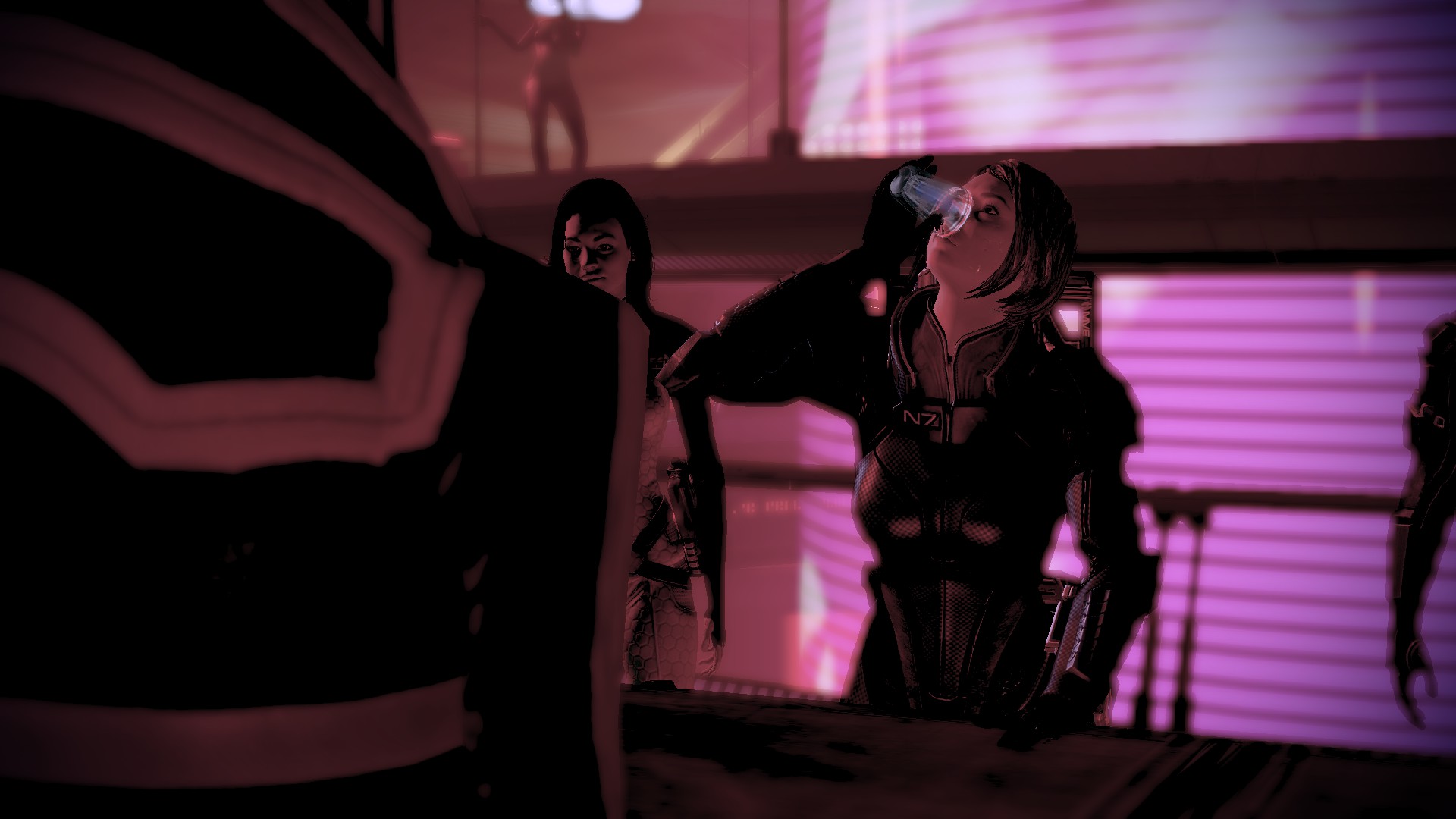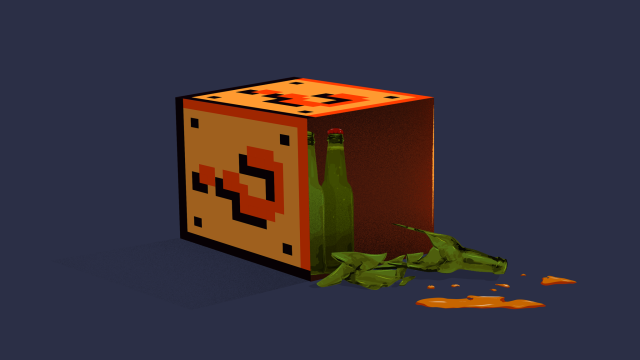Illustration: Sam Woolley
I never pass up the opportunity to drink in a game. I’ve visited every bar in The Witcher 3.
I’ve filled Adam Jensen’s pockets with booze in Deus Ex; I’ve chugged those drinks in the bars in Hengsha and Prague, alone in his apartment, or on street corners just because. I’ve gotten Commander Shepard blackout drunk in every bar in Mass Effect.
In real life, I’ve probably had a beer at my side when I did it all. Alcohol, whether real or virtual, has a pull that games both downplay and celebrate.
This piece has been edited since it originally appeared in March 2018.
Drinking in games doesn’t feel good. It doesn’t feel like anything. A game can’t convey the burn of a good whiskey or the relief of a cold beer, but most games don’t bother to try.
Alcohol is there, and then your character is drunk. Many games that have alcohol offer it as a healing item that also forces a temporary tradeoff like blurred vision or less accurate controls.
It might heal you, but it will also briefly make it harder to fight or walk a straight line Alcohol complicates one of video games’ routine acts, similar to real life.
Sometimes drinking in games just functions as drinking, without the health benefits. Commander Shepard can get blackout drunk in Mass Effect, knocking back stronger and stronger brews and slurring herself into a cutscene.
Drinking, or more specifically being drunk, is played for laughs in Grand Theft Auto, Red Dead Redemption, and Sea of Thieves. It blurs the screen, makes your character stumble, makes them puke.
Watching a drunk character stagger around until they collapse is mostly just a boring, occasionally disturbing joke.
Grand Theft Auto 5
Some games use alcohol more creatively. In recent cyberpunk game The Red Strings Club, the player uses alcohol to manipulate other characters’ moods. Through dialogue between a bartender and his clients, the game tries to approximate alcohol’s nonsensical highs and lows.
In This War of Mine, a game about a group of civilians trying to survive in a war-torn city, people will get less sad when they drink. They will also become useless. I once had a drunk character flop outside the bathroom door and die from illness while live-saving pills waited just across the threshold.
In Prey, alcohol reduces your fear status briefly, paradoxically improving your vision and accuracy. Fallout uses alcohol to boost stats like strength and charisma but will also lower some stats if you get addicted. It’s more late-stage alcoholism than everyday drinking, but it’s a more interesting take than drinking until you pass out.
The 2014 hacker vigilante adventure Watch Dogs conveys the physical act of drinking as a series of minigames spread across Chicago.
Protagonist Aiden Pearce can run a circuit against the city’s three heaviest drinkers, beating them in 10-round drinking contests. The drinking itself is mechanically interesting, requiring the player to perform a series of button presses and target alignments.
These actions bear no resemblance to the simplicity of lifting a drink to your mouth, but they put some resistance between a full and empty glass. Watch Dogs‘ drinking game, with its number of rounds, the inane chatter in its bars, and its swirling on-screen targets, shows drinking as uncomfortable excess. It shows alcohol as a trial, as something to endure.

Watch Dogs
Video games tend to show drinking as a problem and also often use drinking problems as a defining character trait. Alcoholism serves as character shorthand. Max Payne is an alcoholic, as is Pam in Stardew Valley.
Bioshock Infinite may offer alcohol as a healing item, but we’re also shown that protagonist Booker DeWitt has a drinking problem. The fact that booze flows freely in the floating sky city of Columbia highlights what a fantasy world the place is for Booker.
There’s an achievement, “Lost Weekend,” for killing five enemies while drunk, which can be seen as both a joke and a nod to Booker’s passions for both drinking and violence.
In 2016’s mellow wilderness adventure Firewatch, protagonist Henry is running from a drinking problem when he goes to work as a fire lookout. Early in his park tenure, he breaks up two teenagers skinnydipping in the lake, where he finds a bottle of whiskey. For the rest of the game he can pick the bottle up and fondle it lovingly. He never uncorks it, but his obsession is clear.
Kentucky Route Zero‘s Conway has a nasty past with alcohol, and the game’s interlude, The Entertainment, takes place entirely in a bar. KRZ and Firewatch, instead of portraying drinking, explore the desire to drink.
They’re probably the most loving exploration of alcohol in games, even if both takes are negative. But their characters, like those in Max Payne, Bioshock Infinite, and Stardew Valley, are sad, lonely, regret-laden. What a downer.
In games, drinking’s only consequences are either ‘hilariously’ falling down the stairs or ruining your entire life.

Kentucky Route Zero
You’ll have a hard time finding a video game that presents drinking as pleasure, that simulates the buzz of a cocktail, the lubrication of conversation, or the relaxation after a hard day that a cocktail, a beer, or a glass of wine might provide. There are some examples.
Wolfenstein II‘s memorable party scene uses alcohol to help its characters bond and celebrate after a tough fight, even if it quickly gets out of hand. Watch Dogs and Red Dead Redemption, in addition to letting you drink too much, also use alcohol to improve how you handle your guns without a deleterious side effect, hinting at the calming power of a quick drink.
You can step away from the bar in Mass Effect and Red Dead before getting incapacitated, though drinking in both games is still somewhat grim, involving slamming back a drink with a shake of the head.
Video games mostly focus on the idea of drinking to excess, regardless of amount. They show that the usual quantity of alcohol a person is going to drink is too much. Maybe there’s a moral undertone, an obligation to portray drinking as bad to avoid glorifying it to an audience of kids or young adults.
It’s not possible to drink responsibly in so many of these games that include alcohol, nor is it possible to grapple with everything drinking can be besides being something that makes you sloppily drunk. Even one drink is usually too many for our video game heroes.
Games treat guns, bombs, or violent death as commonplace, rare as they may be in most of our lives. They’re not placed in games as something exceptional to gawk at or affect our hero. These same games hold up alcohol, for many people an everyday object, as a powerful, derailing disruption.
They struggle with it as much as any addict, unable to hold their liquor or avoid overindulging in it.

Mass Effect 2
Ultimately, these games’ implied wariness of drinking speaks to alcohol’s power. In the real world, alcohol has the power to transform a moment. It makes now feel like a good idea, someplace safe and desirable. It’s something that’s not true for a lot of us when we’re sober.
Video games are good at transforming the moments of our lives, too. The now of games is relentlessly enticing, much better than the reality of sitting in front of your computer or your TV clicking some buttons.
They can offer the same pull as a drink, the same one more, the same possibility for addiction if you want to call it that. Many of us – gamers, drinkers, and otherwise – struggle to really be present in our own lives. The present is both overwhelming and not nearly enough.
Booze makes the present feel like it will last forever, something most of us both long for and dread; so do games. The next round, either in a game or at a bar, promises a temporary reprieve. They’re a seemingly perfect match.
Of course, a lot of things in life offer this time-out-of-time: music, sports, romance, art. But games don’t treat those things the same way they treat alcohol. Games play up alcohol’s uniqueness while simultaneously warning against it, imbuing their virtual booze with all the escapist threat of its real life counterpart.
Alcohol, like games, promises to be an end in itself. It’s easy to take those ends to extremes, but, rare as it is to see in games, it’s also possible to find a joyful middle ground.

Comments
24 responses to “Video Games Can’t Handle Their Booze”
I’m a weed consumer. We aren’t represented in gaming at all even though our vice is less damaging than perfectly legal alcohol.
Won’t someone please think of the poor pot smokers!
Yeah it did sorta sound like that’s what I was fishing for. I guess a lot of us just want be normalised.
#weedtoo
Stoner representation is partly why I revisit a particular mission in Far Cry 3 and enjoy the Reggie and Yogi cutscenes in FC4.
Who needs smoking in games when you can smoke and PLAY games?!
I like to drink, and I like to game, but when I do both all I get out of it is shitty performance. When I smoke and play a good game, its a whole new level of enjoyable.
It does make me suck at everything that’s not Trials or Rocket League though.
I find performance goes either way for me when high. I used to spreadsheet my Splatoon (Wii U) performance when high and my win rate was better high, which I think came down to less nerves.
I find that games that require “flow” improve, but anything that requires snap reflexes (shooters) or, god forbid, a ton if brain power suffer.
I don’t play anything with a story that requires alot of remembering, or anything that requires a lot of inventory management (other than Fallout 4).
It’s different between users, I feel. As an adult mandude with ADHD, I don’t feel I get the memory issues (I play RPGs high, currently Skyrim and Xenoblade 2), but it could also be tolerance (I smoke daily during after work hours).
I think the worst experience I’ve had is playing Arkham Knight, but only because I felt Batman wouldn’t approve of being controlled by a stoner. It was odd, but a thought I kept coming back to nonetheless.
On an only tangentially related note: in Fallout 2, I would always buy every drug I could find in bulk because they were high value items which took up very little inventory space and, when there wasn’t enough cash around to trade with, I could trade in narcotics. I thought there was something vaguely poetic (if not morally bankrupt) about being a drug-dealer to the wastes.
As a drinker (non violent one) and not a smoker this song always made me laugh because i knew a fair few people on both sides of the arguement.
https://genius.com/The-streets-the-irony-of-it-all-lyrics
CHYOOOON!
I know which album I’m listening to this avo…
Good news! You can craft ‘oregano’ into consumables in Far Cry 5. It literally appears as a small zip-lock baggy, then turns into a joint. Magic
That was surprisingly deep. Bravo!
Although, I agree with most of the article and your point that games rarely present the positives of drinking, such as “the lubrication of conversation” as you put it, I’d say that’s a hard thing to put in a game. Conversations while drunk can be all over the place, or random & non-sequitur to a sober person, and it can be hard to convey that feeling via dialogue trees and word choices written by a writer. That being said, it isn’t unachievable. I’d say the scene in Witcher 3
where Geralt gets drunk with Eskel & Lambertportrayed the fun & mischievousness of being drunk pretty well.I am the opposite, I will steer clear of alcohol in games to the point if I somehow manage to pick some up by accident ill just drop it when I notice it. Just personal opinion, I think alcohol ruins too many lives.
Me too. I stopped drinking a few years ago and even in games it’s very rare for me to drink. I just think it’s stupid now. And yes, totally ruins lives. Not all of them but it’s amazing how many people I have on FB and insta who almost never upload a pic where they don’t have a drink in their hand. I mean it’s fine if they stop at one. But I don’t think they ever do.
The difference between the portrayal of violence and alcoholism is that the second one is a much more common and real issue for your average gamer than the former. While it is usually easy to keep videogame violence compartmentalised in the fantasy world, without an opportunity to bleed into a real life, alcoholism may happen to anybody. You’d have to be really irresponsible to glorify or glamorise an easily replicable vice with potential destructive outcomes in a game that impressionable minds consume.
Because school shootings happen because of video games and people learn vices not from their urges/impulses but via inspiration from a third party?
Nah man. Representing a vice doesn’t inspire it. Human compulsion inspired it.
Yeah, I can agree with that. That’s why I didn’t use words such as “inspire”. Having said that, societal norms (and a proper raising) usually do well enough to quell the compulsion you speak of; the glamorising or glorifying of vice, on the other hand, give excuses to give in to such compulsions. And we all know that teenagers are at a stage where going against the grain is one of the ways of expressing their nascent identity.
Obviously, that’s not possible to measure, but I say the less encouragement they get cannot possibly be bad.
Your probably right. There’s no black amd white to these things and it’s easy enough to dismiss the inspiration value of some media based on the fact you may be a fan of it and feel somewhat defensive about the notion it can be used for ill intent.
I mean, look at how many people started acting like cocks just because they wanted to be Rick Sanchez.
I think some people adopt things that appeal to them into their persona (or at least attempt to) and in order to ingrain it more strongly, they act out on their inspiration.
I dunno, might that not actually encourage risk taking behaviour in some teenagers? Demonising alcohol would probably make it more likely that a rebellious teenager would turn to drink – purely because it’s something that they’re not supposed to be doing.
For me personally I would say no encouragement, no discouragement (underage drinkers notwithstanding) – the truth is where it’s at.
@Riley You should give HuniePop a go 😉
There’s a VR game out where you start bar fights with random people and drink more to get your health back.
I think it’s called “drunkn bar fight”
This is a really minor, but excellent wording change. 10/10
The party scenes in Red Dead 2 show the full range. You can walk around with your beer or whiskey, taking sips or downing it all in one go.
There’s singalongs, laughter, stories. The characters really loosen up. Not everyone can handle their drink,though.The later you stay up, the more you see arguments, fighting, vomiting, passing out and self loathing.